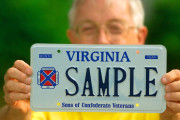WASHINGTON — “Would you be mine? Could you be mine? Won’t you be my neighbor?”
Millions sang along to those lyrics as a father figure tossed his loafer from hand to hand, casually zipped up his sweater and invited children and parents into his home, which was just a trolley away from the world of make believe on “Mister Rogers’ Neighborhood.”
But beneath the aw-shucks demeanor — spoofed hilariously by Eddie Murphy on “SNL” — there was far more depth to Fred Rogers, as revealed in the tear-jerking documentary “Won’t You Be My Neighbor?” on what would have been the year of his 90th birthday.
“The karma and kismet was right for this film at this moment,” producer Nicholas Ma said. “In the past two years, there’s been a remarkable interest in Fred and his legacy, in particular his ability to craft over 30 years a message that unified Americans from all parts of the country. … From the ages of 2 to 6, children would sit in front of his television and understand something profound (about) what it means to be a kind person.”
Directed by Morgan Neville (“20 Feet From Stardom”), the film follows Rogers from his meek childhood to his pioneering television ideas to his altruistic life philosophy.
“The first thing his widow said: ‘Please don’t make him out to be a saint,'” Ma said. “He was someone who tried incredibly hard and took the work he did incredibly seriously, but it wasn’t that it was easy and it wasn’t that he was born that way. He said, ‘This is something that’s important, important for me and important for others, so I’m going do it.’ That’s a good reminder that we actually have the power to change the world around us.”
Neville and Ma, who happens to be the son of cellist Yo-Yo Ma, paint Rogers as a father figure to millions and one who pulled inspiration from his own childhood insecurities.
“He was able with this small puppet to bring to the surface the fears that he had as a child,” Ma said. “One of my favorite moments (is) Daniel Tiger talking to Lady Aberlin about feeling like a mistake. … I think that shows the vulnerability he was willing to bring to the show at all times and also the doubt that spurred him to keep doing it for so many years.”
His philosophy was to treat kids with the respect that they can handle any subject.
“Fred talked about all sorts of issues, from Bobby Kennedy’s assassination to divorce,” Ma said. “Anything a child might encounter in life was fair game. … He started going deeper into questions of death and inclusivity. He was one of the first people on television to feature children with special needs. … Fear is at the root of so many ills in this world. He wanted to give children for whom the world can be a scary place the tools to understand.”
Along the way, Rogers represented a cross-section of America that was hard to put in a political box. On the one hand, he was a devout Christian and lifelong Republican. On the other, he was subversively progressive, inviting his gay African-American co-star François Clemmons to wash his feet with him at a time when swimming pools were segregated.
“Fred was keen to make sure that he challenged any audience,” Ma said. “He challenged an audience that perhaps had lost their faith to see faith as something that could be a source of strength. He challenged audiences that perhaps were less inclusive to see inclusion as a core component of what it means to be human. … He was an ordained Presbyterian minister, but he never wanted to preach. He wanted to teach, to elevate.”
That elevated conversation provides the film’s most inspiring moment, when Rogers testifies before Congress about the importance of children’s programming to save funding for PBS. It was a mission he continued right up to his final years, televising messages of hope after 9/11 and calling the task of the new millennium to make America good again.
“He would see hope in the future, but he would also see a responsibility on each of us, not just on our leaders, to bring the best of who we are to the world,” Ma said. “He put it so lovely in his commencement speech at Dartmouth at the end of his life, in which he asked us to thank those people who have encouraged us to be the best within us.”
As we wipe tears off our cheeks, what do the filmmakers hope audiences take away?
“I always walk away feeling challenged to do better and confident that I can,” Ma said.
It’s a message built into the fictional address of Mister Rogers’ neighborhood, “143,” which he chose because each digit represents the number of letters in the words “I love you.”
In that warm light, the four-star rating system doesn’t apply to this documentary.
This movie gets 143 stars.
Listen to our full conversation with “Won’t You Be My Neighbor?” producer Nicholas Ma below:







